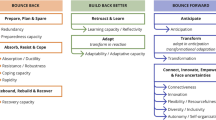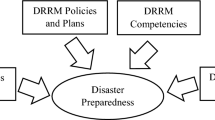Abstract
Strong public health system capacity is essential to protection against climate change health threats. Taken as a whole, the United States (U.S.) public health system lacks the requisite capacity. Unlike some other countries, the U.S. federal government and most state and local governments give low priority to strengthening public health capacity even though states and localities have begun investing billions of dollars in strategies to protect physical infrastructure from climate change-related severe weather events. I recommend enactment of new legislative authority specifically to develop public health capacity more rapidly and completely. Doing so can give new impetus to construction of, ultimately, a national public health system able to protect all those who reside in the U.S. from climate change health threats and to serve as a model for building such system capacity globally.
Similar content being viewed by others
References
United States Global Change Research Program. Fourth national climate assessment, volume ii: impacts, risks, and adaptation in the United States. 2018. https://nca2018.globalchange.gov/downloads/NCA4_2018_FullReport.pdf. Accessed 11 Sept 2019.
Intergovernmental Panel on Climate Change. Global warming of 1.5°C. https://www.ipcc.ch/site/assets/uploads/sites/2/2019/05/SR15_SPM_version_report_LR.pdf. Accessed 11 Sept 2019.
LeRoy S, Wiles R. High-tide tax: sea-level rise case study. Center for Climate Integrity. 2019. https://www.ipcc.ch/site/assets/uploads/sites/2/2019/05/SR15_SPM_version_report_LR.pdf. Accessed 11 Sept 2019.
National Association of County and City Health Officials. Forces of Change in America’s Local Public Health System. 2018. http://nacchoprofilestudy.org/wp-content/uploads/2018/12/2018-Forces-of-Change-Main-Report.pdf. Accessed 11 Sept 2019.
Climate Central. Health and Climate Change Landscape Assessment. 2017. https://www.rwjf.org/content/dam/farm/reports/reports/2017/rwjf439733. Accessed 11 Sept 2019.
National Association of County and City Health Officials. 2016 National Profile of Local Health Departments. 2017. https://nacchoprofilestudy.org/wp-content/uploads/2017/10/ProfileReport_Aug2017_final.pdf. Accessed 11 Sept 2019.
Association of State and Territorial Health Officials. Profile of state and territorial public health, vol. 4. 2017. https://www.astho.org/Profile/Volume-Four/2016-ASTHO-Profile-of-State-and-Territorial-Public-Health/. Accessed 11 Sept 2019.
McKillop M, Ilakkuvan V. The impact of chronic underfunding on America’s public health system. Trust for America’s Health. 2019. https://www.tfah.org/report-details/2019-funding-report/. Accessed 11 Sept 2019.
National Association of County and City Health Officials. 12 Steps to Operationalize Climate Change in a Local Health Department. 2014. https://www.naccho.org/preparedness-brief/naccho-fact-sheet-helps-to-operationalize-climate-change-programs-in-local-health-departments. Accessed 11 Sept 2019.
Roser-Renouf C, Maibach EW, Li J. Adapting to the changing climate: an assessment of local health department preparations for climate change-related health threats, 2008–2012. PLoS ONE. 2016;11(3):e0151558.
National Academies of Science, Engineering, and Medicine. Management of Legionella in Water Systems. 2019. https://www.nap.edu/catalog/25474/management-of-legionella-in-water-systems. Accessed 19 Nov 2019.
Centers for Disease Control and Prevention. CDC Division of Vector-Borne Diseases. Vector-Borne Disease Regional Centers of Excellence. https://www.cdc.gov/ncezid/dvbd/about/prepare-nation/coe.html. Accessed 19 Nov 2019.
Gregg R, Braddock KN, Kershner JM. The state of climate adaptation in public health: an assessment of 16 states. 2019. https://www.cakex.org/documents/state-climate-adaptation-public-health-assessment-16-us-states. Accessed 11 Sept 2019.
American Public Health Association. Adaptation in Action, Part II. 2018. https://www.apha.org/media/files/pdf/topics/climate/adaptation_in_action_part_2.ashx?la=en&hash=87A791182153A590EE7C5C97AE94EEC2691EFD6E. Accessed 11 Sept 2019.
San Francisco Department of Public Health. San Francisco’s Climate and Health Adaptation Framework. 2017. https://sfclimatehealth.org/wp-content/uploads/2018/12/SFDPH_ClimateHealthAdaptFramework2017a.pdf. Accessed 11 Sept 2019.
Federal Emergency Management Agency. State Mitigation Plan Review Guide (FP 302-0942). Washington, DC: FEMA; 2015.
Watts Nick, et al. The 2019 report of The Lancet Countdown on health and climate change: ensuring that the health of a child born today is not defined by a changing climate. The Lancet. 2019;394:1836–78.
WHO Regional Office for Europe. Public health and climate change adaptation policies in the European Union: final report. 2018. http://www.euro.who.int/__data/assets/pdf_file/0010/386965/Pagoda-REPORT-final-published-2.pdf?ua=1. Accessed 19 Nov 2019.
HR 3962, 115th Congress; 2017.
HR 1243, 116th Congress; 2019.
State of Hawaii, House of Representatives. HB 591. 2015.
Maibach EW, Kreslake JM, Roser-Renouf C, Rosenthal S, Feinberg G, Leiserowirz A. Do Americans understand that global warming is harmful to human health? Evidence from a national survey. Ann Glob Health. 2015;81:396–409.
Funk C, Kennedy B. How Americans see climate change in 5 charts. 2019. https://www.pewresearch.org/fact-tank/2019/04/19/how-americans-see-climate-change-in-5-charts/. Accessed 11 Sept 2019.
Acknowledgements
The author would like to acknowledge the helpful comments from anonymous reviewers.
Author information
Authors and Affiliations
Corresponding author
Additional information
Publisher's Note
Springer Nature remains neutral with regard to jurisdictional claims in published maps and institutional affiliations.
Rights and permissions
About this article
Cite this article
Moulton, A.D. Needed: new authority to build public health system capacity for climate change health threats. J Public Health Pol 41, 14–23 (2020). https://doi.org/10.1057/s41271-019-00210-4
Published:
Issue Date:
DOI: https://doi.org/10.1057/s41271-019-00210-4




